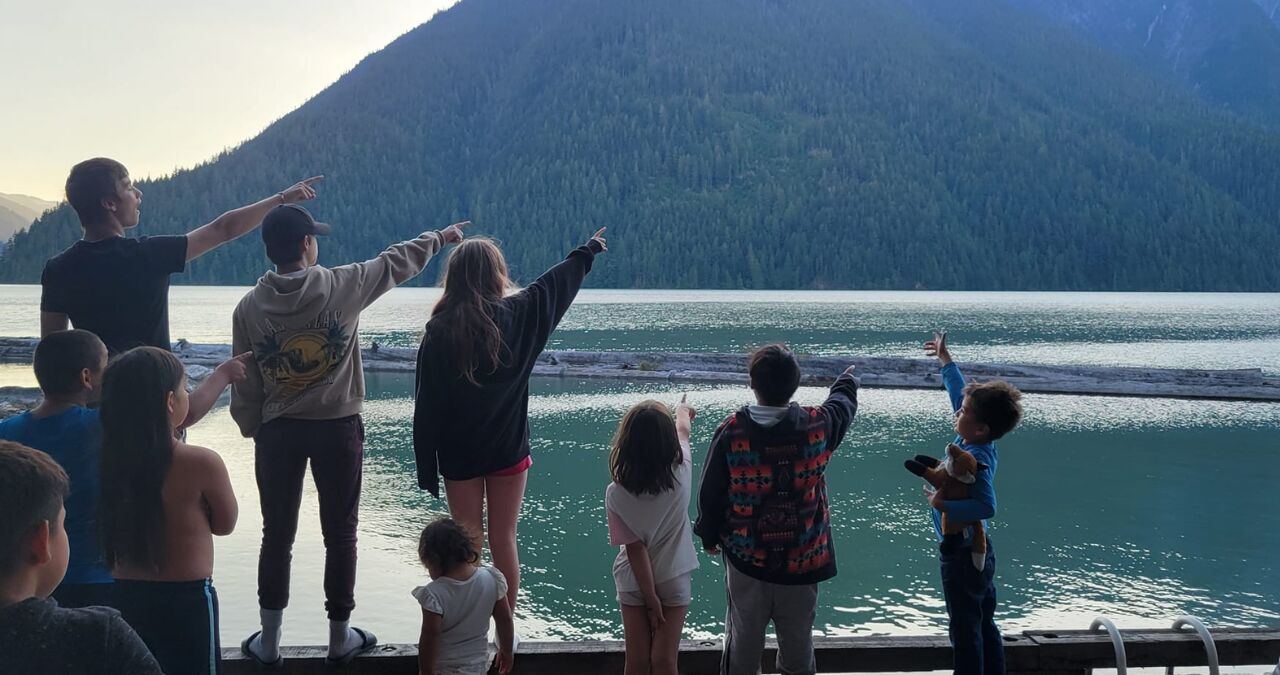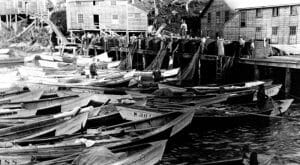Estimated Reading time

4 Mins
Through CFA Incubator, Wuikinuxv Nation and Coast Funds Will Explore Finance Options for Salmon Restoration
New conservation finance tools – like a salmon impact bond or a short-term endowment – could unlock new funding for salmon stewardship in Wuikinuxv territory.

Through an incubator program, Wuikinuxv Nation is partnering with Coast Funds and the Conservation Finance Alliance (CFA) to assess the feasibility of conservation finance mechanisms that could generate long-term revenue for the Nation’s salmon and watershed priorities. This project was recently awarded seed funding and project support through the CFA’s 2025 Incubator cohort, announced in early June.
With salmon populations in a state of decline, finding ways to support the communities who care for the delicate ecosystems that salmon inhabit has never been more important.
“Lands and waters can only be as strong and healthy as those who sustain them,” said Chief Councillor Shaw, who’s directing the project team alongside Stewardship Director Andra Forney and Salmon Reconciliation Coordinator, Raven Walkus. “New long-term financing options can help our community continue to protect and manage salmon for food, livelihoods, and future generations.”
A salmon impact bond is a nature bond designed to attract investment in Indigenous-led salmon habitat restoration and community development. Over the next six months, and with support from CFA, Wuikinuxv Nation and Coast Funds will work together to determine the feasibility of a salmon impact bond – alongside other conservation finance tools – by assessing bond design and structure, community defined outcome metrics, market interest, project risks, and scalability.
(Video: Conservation Finance Alliance)
Wuikinuxv Nation have stewarded their territories for millennia
The Wuikinuxv Nation’s abundant territory extends from Koeye River to Cranstown Point. Today, the Nation hosts a reserve community at the head of Rivers Inlet stretching along the Wannock River into Wuikinuxv Lake.
The salmon impact bond project comes at a time when the Wuikinuxv Nation are making strides to restore their salmon and related cultural connections in their territories after the impacts of modern fishing practices, canneries, and – in more recent times – climate change. Salmon runs, once an abundant resource in the territory, fell to 0.1 per cent of historic levels in 1999, and today, about half of Pacific salmon populations are in a state of decline. Wuikinuxv Nation has been working to reverse this collapse.

Salmon, which are vital to maintaining numerous healthy ecosystems, are also an important part of Wuikinuxv Nation’s food security, as well as the social, cultural, and economic well-being of the community.
Historically, Wannock River had a prolific sockeye salmon run that rivaled British Columbia’s largest salmon runs found in Skeena River and Nass River. The collapse of the sockeye run resulted in devastation to the ecosystem and impacted Wuikinuxv peoples’ ability to stay and feed their community. Today, there are 300 members of the Wuikinuxv Nation, with less than 100 members having the ability to reside in the territory year-round.
Investing in programs that restore salmon stocks could expand Wuikinuxv Nation’s opportunities to build a sustainable economy and healthy ecosystems, supporting the community’s return to their territory and the continuation of their long-lasting cultural traditions.
Learn more about Wuikinuxv Nation and their rich history. (Video: Wuikinuxv Nation)
In 2023, Chief Councillor Shaw was one of 15 First Nations representatives who joined in the announcement of the Marine Protected Area (MPA) Network Action Plan at IMPAC5, the fifth International Marine Protected Areas Congress. Involving more than a decade of work, the MPA Network Action Plan sets a timeline and strategy for collaborative governance of more than 3 million hectares of new and existing protected areas in the Great Bear Sea, also known as the Northern Shelf Bioregion.
Announced in June 2025, the Great Bear Sea PFP secured $335 million in durable long-term funding to support 17 First Nations to exercise their marine stewardship responsibilities and invest in their communities. For the Wuikinuxv Nation, this has led to recent improvements to their stewardship office operations, enhanced Guardian Watchmen programs, and important research and management planning for their marine stewardship projects.
Piloting ways to diversify funds
While the Great Bear Sea PFP is a significant step to supporting the growth of First Nations’ stewardship programs, there are still many financial gaps to fill. New conservation finance tools can bring in complementary revenue for Wuikinuxv Nation to grow and sustain its Guardian and stewardship programs.
“The amount we’re working with [through the PFP] is still quite modest,” Chief Councillor Shaw reminded audiences at the recent Salazar Symposium in Vancouver. “Our communities are contributing a lot of our own resources, while balancing other priorities. This is one piece of a very complex puzzle.”
With diversified financing, Wuikinuxv Nation is reasserting its rights to self-determination and its inherent responsibility to manage the lands, waters, and life in its traditional territory.
In 2024, Coast Funds published Finance for Forests, a report exploring conservation finance mechanisms (including social finance and pay for success models) that can support First Nations’ conservation community priorities. The report includes four conservation finance model portfolios. One of which includes a salmon impact bond, which was partially inspired by the Deshkan Ziibi Conservation Impact Bond, which pairs impact investments with corporate and governmental support. Coast Funds is continuing to explore this concept through informal engagements with First Nations, philanthropic partners, and Crown governments.
Impact bonds can provide a way for socially responsible investors to support conservation and make a modest return on their investment. Importantly, this mechanism is designed to finance a shared objective; the community defines the outcomes and indicator criteria that support repayment of the initial investment.
“Coast Funds is excited to partner with the Conservation Finance Alliance again,” says CEO Eddy Adra, who is supporting the Wuikinuxv-led team. “Through this program, our team will build on its experience and test innovative conservation finance tools that can deliver long-term revenue.”
Over the next six months, Wuikinuxv Nation will tap into Coast Funds’ financial expertise and CFA’s network of partners and funders to assess opportunities and build a feasibility case for early investors interested in supporting Indigenous-led conservation.
Expected to conclude in January 2026, the salmon impact bond feasibility assessment project is one of 10 selected (from 73 applications) for this year’s CFA Incubator program, which delivers $25,000 in seed funding, along with mentorship, technical assistance, and global exposure.
Further Reading
Access the full CFA Incubator cohort list.
Read Coast Funds’ Finance for Forests.
Learn more about Wuikinuxv Nation.
Read about the decline of salmon populations.
Story: West Sea Otter Water Taxi.
News article about Wuikinuxv Nation salmon restoration.
